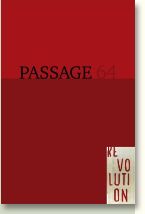Utopiens grænser i Den amerikanske revolution
DOI:
https://doi.org/10.7146/pas.v25i64.7919Resumé
Mikkel Birk Jespersen: "Utopiens grænser i Den amerikanske revolution - Om utopiske tekststrategier i Common Sense og Letters from an American Farmer"
Abstract
Mikkel Birk Jespersen: “Boundaries of Utopia in the American Revolution: On Utopian Text Strategies in Common Sense and Letters from an American Farmer”
The article discusses the relations between utopia, literature and revolution in the American Revolution through an analysis of Tom Paine’s Common Sense (1776) and J. Hector St. John de Crèvecoeur’s Letters from an American Farmer (1782). It is argued
that utopia constitutes a textual function whose ‘non-place’ or ‘point zero’ is not reducible to a political logic, but rather presents a challenge to it. In the revolution, however, the different logics of utopia and of the political can be said to confront each other, hereby illuminating the contradictions of both. The constellation of the two texts brings out the contradictory nature of utopia, as the texts have opposed approaches to the revolution and are characterised by two different utopian logics.
Downloads
Publiceret
Citation/Eksport
Nummer
Sektion
Licens
Forfattere, der publicerer deres værker via dette tidsskrift, accepterer følgende vilkår:
- Forfattere bevarer deres ophavsret og giver tidsskriftet ret til første publicering, samtidigt med at værket efter publiceringen er omfattet af en Creative Commons Attribution-licens, der giver andre ret til at dele værket med en anerkendelse af værkets forfatter og første publicering i nærværende tidsskrift.
- Forfattere kan indgå flere separate kontraktlige aftaler om ikke-eksklusiv distribution af tidsskriftets publicerede version af værket (f.eks. sende det til et institutionslager eller udgive det i en bog), med en anerkendelse af værkets første publicering i nærværende tidsskrift.
- Forfattere har ret til og opfordres til at publicere deres værker online (f.eks. i institutionslagre eller på deres websted) forud for og under manuskriptprocessen, da dette kan føre til produktive udvekslinger, samt tidligere og større citater fra publicerede værker (se The Effect of Open Access).





